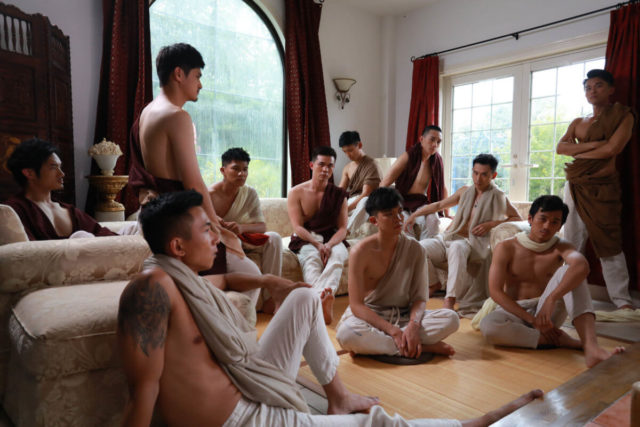In his provocative eighth film, “Apostles,” Hong Kong filmmaker Scud takes on the topics of death and reincarnation. The story concerns a dozen young men who meet with Antonio (Jach Chow), who guides them at his estate in the ways of Socrates and Plato, his mentors.
The film is episodic, and it features moments set in the past, present, and future. There is talk of ghosts, karma, and the afterlife. There are myths and rituals discussed and enacted. One sequence features a Sisyphus character (Teslin), who is seen literally moving a boulder. But Scud keeps a light touch with the philosophical material. One of the ways he accomplishes this is by having his young, attractive cast spend much of their screen time naked. (Scud deliberately films full nudity.)
When one of the young men recounts a story of seeing ghosts, he recalls taking a shower in the gym only to be trapped there overnight. A handful of naked male ghosts enter the weight room, sparking his desire. Another man talks about a dating app that leads to some gay sex scenes. And there is a passionate encounter between Antonio and one of his male disciples. “Apostles” makes these brief episodes erotic, but Scud is less interested in sex and more focused on examining death — even if the opening credit sequence features a young man (Qiji Chen) masturbating vigorously as he claiming in voiceover, “Death became the only thing that makes me aroused.”
Conversations between Antonio and members of the group are about how we perceive death — is it something to be feared, or embraced? The men calculate how many seconds of life we have (over 1 billion given a life expectancy of 70 years). There is talk about babies and how they are old souls who are newborns. And there are considerations about one’s legacy and what one may be remembered for — if one is remembered at all.
Scud may be writing his own legacy with “Apostles,” as he peppers some scenes with clips from his other films, most notably, “Utopians,” (2015) “Adonis,” (2017) and “Bodyshop” (2022, and available in 2023). On screen credits indicate these snippets, and while fans of the director will appreciate the connections, viewers who have not seen these films will understand the references with the cues. One use of the overlapping characters involves the actor Adonis He, from Scud’s film, “Adonis,” showing up (naked, of course) in 2324, where he meets two women who comment on seeing his film from 300 years ago. This scene segues into a discussion of rebirth and time. Another self-referential moment has Scud himself in a cameo as Michael J. Kutza, founder of the Chicago Film Festival, evaluates a pivotal scene in “Apostles.”
One interesting sequence unfolds in the Sea of Trees. The men walk through the famed forest where people got to hang themselves contemplating their existence. It foreshadows a later scene which involves a sacrifice at Antonio’s estate that has the 12 men debating who should give their life and why.
“Apostles” builds to this dramatic moment, which is somber, but it is followed by a sequence that is far more disturbing. However, these scenes soon reveal a payoff that becomes something rather life-affirming. Scud’s intention here is to examine death as way of reminding the characters and viewers of the value of life. It is an important message, and one the filmmaker has included to various degrees in most of his films.
Scud does leave his film open to interpretation, and multiple viewings of “Apostles” (along with “Utopians” and “Adonis”) may yield greater insights into some of the philosophical concepts on display.
But for viewers less inclined to think about the deep meanings, “Apostles” is full of beautiful images. One shot of a dozen naked “souls” climbing a volcano is striking because of the contrast of skin and ash. Other homoerotic scenes featuring the men bathing together, or sharing tents, are cozy and create a sense of intimacy. There are also gorgeous scenes featuring Kai (Huang Wei Kai), a dancer, performing ballet moves in the nude.
Scud also employs several nifty visual techniques in the film, from sequences that unfold in reverse, to some upside-down scenes (meant to represent the underworld) to one 360-degree pan of the men sitting in a circle that gets faster and faster, ultimately disorienting viewers.
“Apostles” is meant to inspire viewers, and Scud steers his attractive ensemble cast through this heady mix of sex and death with aplomb. His film offers both food for thought and plenty of eye candy.
But for viewers less inclined to think about the deep meanings, “Apostles” is full of beautiful images. One shot of a dozen naked “souls” climbing a volcano is striking because of the contrast of skin and ash. Other homoerotic scenes featuring the men bathing together, or sharing tents, are cozy and create a sense of intimacy. There are also gorgeous scenes featuring Kai (Huang Wei Kai), a dancer, performing ballet moves in the nude.
Scud also employs several nifty visual techniques in the film, from sequences that unfold in reverse, to some upside-down scenes (meant to represent the underworld) to one 360-degree pan of the men sitting in a circle that gets faster and faster, ultimately disorienting viewers.
“Apostles” is meant to inspire viewers, and Scud steers his attractive ensemble cast through this heady mix of sex and death with aplomb. His film offers both food for thought and plenty of eye candy.
